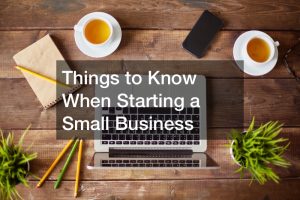
Starting a small business may seem like an exciting prospect, but it can also be challenging. You may already be fighting the urge to get your plans into action, but it’s a good idea to take a step back and consider the things to know when starting a small business. You don’t want to look back and wish you had done things differently. Knowing the things to know when starting a small business ensures that you establish your enterprise using best practices from the start. Even if you’re familiar with the industry, you have to take the approach that you don’t know everything there’s to know. Here are some need-to-know details that will help you better prepare, regardless of your industry or niche.
Understanding Your Customer Is Key

There are so many aspects of operating a business, and some of them may consume your attention more. For instance, if you’re thinking of opening a T shirt printing service, you may spend all your time looking up the designs and talking to apparel printing suppliers. However, before you spend all your time doing this, one of the essential things to know when starting a small business is that your customer’s needs come first. Therefore, it doesn’t matter what sort of designs your T shirts will have unless they’re capable of sparking customer interest. You need to work on understanding your customers and the market as much as possible.
This is especially so if you’re trying to differentiate yourself in an established market. The trick is to develop a powerful and compelling message that grabs customer interest and sets you apart from your competitors. Perhaps you can take the message of sustainability and figure out how you can incorporate that into your service and products, then communicate this effectively to your target market. You should spend time researching the demographics of your potential audience so you can determine their buying habits and capitalize on this information. It’s essential to verify that your customers have a need for your product and service and they’re willing to accept your proposed pricing. Taking a customer-centric approach ensures that your business can achieve its expected sales goals.
Get Expert Advice Makes Life Easier
One of the most important things to know when starting a small business is that you don’t have to figure out everything on your own. The wheel has already been invented, and you can benefit from learning from other successful entrepreneurs who have already been down the same path. That’s why you should consider finding a mentor as soon as possible. There are many benefits of mentorship. For instance, when you meet an obstacle, instead of wasting time trying to solve the issue, your mentor could provide you with an expert viewpoint that will help you resume progress more quickly. Even if you have done your research, it’s easy to feel like you have all the answers, but it’s good to admit that you need help from time to time.
Your mentor is not the only expert you can talk to. You should be willing to get professional help where needed. For instance, the right business lawyer can make life easier for you because you don’t have to handle the legalities of starting a business on your own. Your attorney can help you choose the right business structure and ensure that you’re compliant from a tax perspective. Don’t be afraid to schedule consultations with industry experts and professionals when it can make a huge difference in the success of your business.
Funding and Budgeting Are Essential

An important factor that you have to address early on is how you’ll fund your business. But before you look at ways of raising the working capital you need, it’s important to come up with a budget, so you know how much funding you need. When creating a budget for your business, you first need to analyze costs. Make sure you prioritize important costs, such as rental or lease fees, business insurance, labor, supplies, utilities, business vehicles, equipment, and taxes. This will help keep costs low because the last thing you want is to go over budget by prioritizing non-essentials like designer office wallpaper. At the same time, don’t forget to factor in the smaller but essential expenses, such as IT services and data cable installation, that are relevant to the running of your business. You can also reduce costs by negotiating with suppliers and finding discounts.
The budgeting process should also include an estimate of your revenue, projected cash flow, and gross profit margin, so you can accurately determine your spending goals. Once you have done the math, the next step is to raise the required funds. While there are many things to know when starting a small business, you should know that it only helps if you have the funds to set up operations. Lack of funding is one of the biggest barriers that new business owners face because most entrepreneurs don’t have the means for self-funding. Start by properly identifying the sources of funding available such as business loans, crowdfunding, Angel investors, and invoice financing.
You Need to Write a Business Plan
Most of us are familiar with the concept of a business plan. However, a lot more research is needed to actually come up with an effective business plan. It’s difficult for your business to develop fully in the absence of a business plan. The process of writing this plan will help you figure out if your plan is feasible and whether you can create a roadmap of success that you can follow to achieve your business goals. With a business plan, you don’t have to keep stopping to figure out your next steps. Instead, everything will be laid out for you, and you can quickly execute your plans and transform your dream into reality.
A good place to start is by downloading a suitable template, so you don’t have to craft your business plan from scratch. What should your business plan contain? For starters, it’s recommended to begin with competitor analysis so you can develop a more effective strategy for your business. The data you get can be used to make wiser decisions and provide the answers you need. For instance, using data from the competitor analysis, you’re better able to determine the true purpose of your business and your target market. Other details to include in your plan are details of your proposed product or topic, your funding needs, and the overall costs involved. Your business plan should also include a contingency plan so that you’re always prepared if certain aspects of your business don’t go as planned.
Take Care of the Legalities
As far as things to know when starting a small business, making sure that you have met all the legal requirements is high on the list. There are several legal requirements that you have to meet, and one of them is to determine the best legal structure for your business. Your options include a limited partnership, sole proprietorship, limited liability company, corporation, and S-corporation. It’s important to choose the right legal structure because this will have a huge impact on how you run your business and will influence the way you keep your accounts and pay your taxes. The right legal structure for your business should reduce the risk of liability issues and offer more tax benefits.
You also have to come up with a suitable business name while making sure you’re not registering a name that’s already trademarked. In addition, it’s important to ensure that your business is fully licensed and registered. For example, if you’re a delivery company, you have to investigate the license and permit requirements that apply to delivery companies before you open your business. Even as you’re looking for a good business location, you should be aware of any zoning laws that apply. Make sure you adhere to the relevant health and safety laws and invest in a business insurance policy that provides sufficient coverage. By making sure you’re compliant from the start, you can save yourself a lot of headaches and expenses down the line.
Work on Establishing Your Online Presence

These days, it’s hard to market your business when you don’t have an online presence. Gone are the days where brick and mortar businesses ruled. Now, there’s a lot of competition online because that’s where your customers are. For instance, if you’re planning to open an appliance dealership, you can spend a lot of money printing out flyers and handing them out to people on the road. However, your return on investment might not be high compared to other appliance dealers that have a well-defined digital marketing campaign. You need to understand that more and more consumers are now using the internet to identify the services they need. If your business offers a particular service that’s in demand, then you need to spread the word.
When starting a small business, your success depends on the number of customers you can attract and retain. The good thing about digital marketing is that it allows you to cast a wider net while targeting your ideal customers. Thai ensures that you can make the most of the resources available to you. Digital marketing helps to even the playing field, and it’s possible to gain some online visibility even when you don’t have the large budget of more established companies. It’s important to invest as much as possible into your marketing campaign because it doesn’t matter how good your products or services are unless your target market is aware. Make sure you have a well-designed website and use the right advertising channels, such as social media marketing, depending on where your customers spend most of their time at.
Take Things One Step at A Time

Starting a business may require you to step outside of your comfort zone. There are many things to know when starting a small business, and it’s easy to get overwhelmed with it all. It’s important to remember that you don’t have to bite off more than you can chew. While it’s good to push yourself, you should also not rush through the steps you need to take, or else you’ll end up cutting corners. That’s why it’s good to come up with an action plan. This action plan should list all the things to know when starting a small business. That way, you know you’re on the right track as long as you focus on completing each step.
It’s important to develop an effective plan and stick to that plan as much as possible. You want to give your business the highest chance of success possible. Not having a plan and being unprepared can be scary because you hear so many stories about businesses that failed soon after opening. Instead of rushing in blindly, it’s better to analyze successful companies and what they did right. You should also look at business owners that ended up in a bankruptcy law office to try and figure out how they could have done things differently. Try and spend more time pursuing your business, so you can understand the ins and outs of running it.
As mentioned, the thought of starting your business can be pretty exciting. In this guide, we looked at the top things to know when starting a small business. The aim is to smooth out the process as much as possible and minimize the risk of setbacks, thus making the process even more exciting and enjoyable for you.
Otherwise, things can start to quickly look daunting once you realize that there are so many aspects to starting your own company that you were not aware of. Figuring out the most important things to know when starting a small business will help you navigate the process correctly and efficiently. It will also reduce the risk of making costly mistakes that can interrupt or delay your plans to start a business. Remember, the more you prepare, the better your chances of getting your business to take off successfully.



